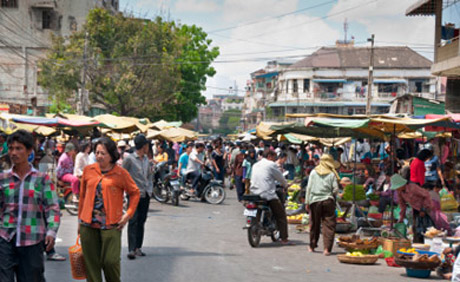(单词翻译:单击)
情景对话
Todd: So on your bike trip, how did you feed yourself. What did you eat?
托德:你在骑行之旅中怎么吃饭?你都吃些什么?
Julia: Hydration was a thing that we worried about. We were able to stop every few kilometres and get fresh young coconuts with the straw in the top. Did you remember doing that?
朱莉娅:我们比较担心水合作用。我们骑几公里几后就会停下来休息一下,用吸管喝点新鲜的椰子汁。你还记得吗?
Todd: Yes, that's great.
托德:记得,非常棒。
Julia: That's like a natural IV hit straight there. You can get, you can live very well just roadside stalls. Breakfast on the street markets. Most Cambodians eat breakfast on the way to work. Like they gather at the market and there's people there selling noodles and the most incredible just homemade stuff.
朱莉娅:就像进行自然静脉注射一样。因为有路边摊,我们可以生活的很好。我们会在路边摊吃早饭。许多柬埔寨人都在上班途中买早饭吃。他们会去路边摊买早点,那里卖面条等大部分自家做的食物。
Todd: So what was a typical breakfast?
托德:一般你们早上吃什么?
Julia: Noodles, usually noodles, some kind of noodles in a soup, like noodle soup I guess probably like in Vietnam, pho, they call it. The Cambodians have a similar thing. A lot of dishes with coconut milk, not as spicy as Thai food but a lot of coriander we call it in the UK. You call it, what do you call it, cilantro, you call it in America?
朱莉娅:面条,基本上是面条,有面条有汤,类似于汤面,我想越南可能称之为越南河粉。柬埔寨也有类似的食物。还有很多用椰奶做的菜,不像泰国食物那么辣,里面会放很多芫荽,我们英国称之为coriander。你们美国用cilantro来表示芫荽,对吧?
Todd: It sounds good.
托德:听起来不错。
Julia: Fabulous, yes, coconut.
朱莉娅:对,非常好,椰子。
Todd: I would imagine a lot of fruit?
托德:我想应该有很多水果吧?
Julia: Let's see. In Cambodia did we get a lot of fruit. Not that much fruit actually in Cambodia. In Vietnam I remember the mangoes. When we crossed the border it was very different even though they're neighboring countries, it was a very different kind of cuisine when we crossed into Vietnam. Palm sugar, cane sugar, we drank a lot of cane sugar, cane sugar drink.
朱莉娅:我想想,柬埔寨有很多水果吗?柬埔寨没有太多水果。我记得越南的芒果。我们穿过边境以后,一切都变得非常不同,虽然柬埔寨和越南是邻国,但是两国的饮食非常不同。我们喝了很多甘蔗汁。
Todd: So during the day how many times would you usually eat?
托德:那你们一天吃几顿饭?
Julia: We'd eat breakfast, usually within the first hour. Oh, the coffee. I remember the coffee. Coffee is made with condensed milk in Cambodia so that was a staple, a big shot of Cambodian coffee with condensed milk in it. We'd have breakfast. We would try and do the bulk of our riding, we'd try and do like sixty K if possible before lunch because it got too hot in the afternoons and we wanted to arrive wherever we were getting before dark because we didn't really, you know the roads weren't safe. And then we'd stop for lunch somewhere but we'd also make it a rest stop and because we didn't all cycle at the same pace, it would probably be about two hours or so by the time we all arrived in the same place. Ate lunch, again rice is a staple and then whatever they had going these lunchtime cafes. And then our evening meal would be probably when we arrived at our guesthouse or the town that we were at in the evening. So we would have three meals a day usually.
朱莉娅:我们会在启程后一个小时内吃早饭。咖啡,我记得咖啡。柬埔寨的咖啡会加炼乳,我们早上一般会喝咖啡,加炼乳的咖啡。我们吃完早饭后,要尽量在午饭前骑行60公里,因为下午太热了,我们要尽量在天黑前抵达目的地,因为路上不太安全。然后,我们会停在路边吃午饭,午饭时间也是我们的休息时间,因为我们骑行的速度不一样,基本上所有人在两个小时内会到达休息地。到达后我们开始吃午饭,主食是米饭,还会喝一些咖啡。通常晚饭我们会在预订的宾馆或是晚上抵达的城镇里吃。基本上来说,我们一天吃三顿饭。
Todd: And then at night you would just stay in a guesthouse?
托德:晚上你们住在宾馆里?
Julia: At night we'd usually stay, yeah, we stayed in guesthouses, yeah.
朱莉娅:对,我们晚上住在宾馆里。
Todd: So how did you feel when you finally reached the end of your trip?
托德:那结束骑行以后你有什么感觉?
Julia: Both elated and saddened. It was a real sense of achievement that we'd made it but I wanted it to go on forever. I then had to fly back out from Ho Chi Minh. We had a few days in Ho Chi Minh just to kind of celebrate that we got to the end but I had to come back to Japan so I flew back via Bangkok, where my husband was actually waiting. I'd been away two months so it was nice to come home. You know I realized when I got to the end that I really missed my husband but during the trip I was very at peace and enjoyed it and I could have just gone on forever I think.
朱莉娅:又兴奋,又有些悲伤。能完成这次骑行之旅真的很有成就感,不过我想永远进行这种骑行。之后我就从胡志明市坐飞机回来了。我们在胡志明市待了几天,庆祝我们完成骑行,不过我必须要飞回日本,我在曼谷转机,我丈夫在等我。我已经离开家两个月了,回到家的感觉真好。我发现,最后结束骑行时我非常想我的丈夫,可是在骑行过程中我很平静,很享受,我想我可以一直这样骑下去。
Todd: Cycle around the world?
托德:骑自行车环游世界?
Julia: Cycle around the world, yeah. I realized that yeah that's how you do it. It's so pleasurable to do it to ride.
朱莉娅:对,骑自行车环游世界,我有这种想法。骑行的感觉非常美妙。
Todd: It sounds like an incredible trip.
托德:听起来这是一次不可思议的旅行。
Julia: It was.
朱莉娅:的确是。
Todd: I'm sure you'll never forget it.
托德:我确定你永远不会忘记这次骑行的。
Julia: No, never, no, no, no.
朱莉娅:对,永远不会忘记,永远。

译文属可可原创,仅供学习交流使用,未经许可请勿转载
重点讲解
重点讲解:
1. be able to do sth. 可以…的,能够…的;
例句:The athlete is able to jump two meters.
这位运动员能跳两米高。
2. even though 即使;尽管;纵然;
例句:We had to go out to work even though it was raining.
尽管下雨,我们也不得不出去工作。
3. or so …左右;…上下;
例句:We can seat you in five minutes or so.
五分钟左右我们就可以为您安排好座位。
4. go on 继续做;
例句:Rainy as it be, they go on with their work.
虽然是雨天,他们仍继续工作。


